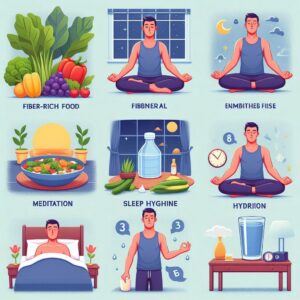Nightfall Decoded: A Comprehensive Guide to Nocturnal Emissions – Symptoms, Causes, Solutions, Myths, and FAQs
Nightfall, also known as nocturnal emissions or wet dreams, is a natural physiological process that occurs when a man experiences involuntary ejaculation during sleep. While this phenomenon is common, especially during adolescence and early adulthood, frequent occurrences can lead to anxiety and concern. This article explores Common Symptoms, Causes, FAQs, various potential solutions to manage and reduce nightfall, focusing on lifestyle modifications, Ayurvedic approaches, and other considerations.

Wet Dreams Nightfall and Nocturnal Emission Explaines
What is Nightfall?
Nightfall occurs when a male ejaculates during sleep, often accompanied by erotic dreams. This process is a normal part of sexual maturation and serves as a mechanism for the body to release accumulated sperm. While occasional nightfall is typical, frequent episodes may lead to discomfort or concern for some individuals.
Common Symptoms of Nightfall
Individuals experiencing nightfall may report various symptoms, which can include:
- Sleeplessness: Disrupted sleep patterns due to anxiety about nightfall.
- Weakness: A feeling of fatigue upon waking.
- Dizziness: Light-headedness that may occur after an episode.
- Loss of Concentration: Difficulty focusing on tasks during the day.
- Tiredness: General fatigue that persists despite adequate rest.
- Dullness: A lack of energy or enthusiasm.
- Depression: Feelings of sadness or hopelessness related to frequent occurrences.
- Knee Pain: Discomfort in the knees that may arise from physical tension during sleep.
- Stress: Anxiety surrounding the phenomenon itself.
Causes of Nightfall
Understanding the underlying causes of nightfall can help in managing its occurrence. Here are some common factors:
- Hormonal Changes: Fluctuations in testosterone levels, particularly during puberty, can trigger nightfall episodes.
- Lack of Sexual Activity: Prolonged periods without sexual release can result in nocturnal emissions as a natural outlet.
- Watching Explicit Content: Exposure to sexually stimulating material can increase sexual tension and lead to nightfall.
- Excessive Genital Stimulation: Frequent stimulation can heighten arousal levels, contributing to nocturnal emissions.
- Inadequate Ejaculation: Not ejaculating regularly can lead to built-up pressure and subsequent nightfall.
- Full Bladder at Night: A full bladder can stimulate the prostate and lead to involuntary ejaculation during sleep.
- Obesity: Higher body weight can affect hormone levels and sexual function, potentially increasing the frequency of nightfall.
- Stress: High levels of stress and anxiety can disrupt normal bodily functions and contribute to nocturnal emissions.
- Physical Inactivity: A sedentary lifestyle may exacerbate stress levels and hormonal imbalances.
Managing Nightfall
While nightfall is typically not a cause for concern, frequent episodes may warrant lifestyle adjustments. Here are some strategies to consider:
- Establish a Regular Sleep Schedule: Going to bed and waking up at consistent times helps to regulate the body’s internal clock.
- Practice Stress Reduction Techniques: Engage in activities such as meditation, yoga, or deep breathing exercises to manage stress effectively.
- Limit Exposure to Sexual Content: Reducing consumption of pornography or other sexually stimulating material can help decrease arousal before bedtime.
- Exercise Regularly: Incorporating physical activity into your daily routine improves overall health and reduces stress levels.
- Wear Comfortable Clothing: Loose-fitting attire can prevent unnecessary physical stimulation during sleep.
- Dietary Adjustments:
- Increase intake of zinc-rich foods (e.g., pumpkin seeds, oysters).
- Consume more fruits and vegetables for essential vitamins and minerals.
- Stay hydrated by drinking plenty of water throughout the day.
- Limit spicy and oily foods that may increase body heat.
- Avoid heavy meals close to bedtime to ensure better sleep quality.
- Seek Professional Guidance: If nightfall becomes a persistent issue causing distress, consulting with a healthcare professional can provide tailored advice and potential treatment options.
Solutions to Stop Nightfall
Lifestyle Modifications
Implementing lifestyle changes can significantly reduce the frequency of nightfall:
- Regular Exercise: Engaging in physical activity helps improve overall health and reduces stress levels. Aim for at least 30 minutes of moderate exercise every day.
- Balanced Diet: Focus on a nutritious diet rich in fruits, vegetables, whole grains, and lean proteins. Foods high in zinc (like pumpkin seeds and oysters) support sexual health.
- Good Sleep Hygiene: Establish consistent sleep schedule. Create a relaxing bedtime routine to enhance sleep quality.
- Stress Management: Techniques such as yoga, meditation, and deep breathing exercises can help alleviate stress and anxiety.
- Avoid Excessive Genital Stimulation: Limit self-stimulation to reduce the likelihood of nightfall occurrences.

6 ways men can stop nightfall permanently
Ayurvedic Approaches
Ayurveda offers various natural remedies that may help manage nightfall:
- Yoga and Meditation: Certain yoga poses strengthen pelvic muscles and promote relaxation. Regular practice can enhance both mental and physical well-being.
- Herbal Remedies: Incorporating herbs like Ashwagandha, Triphala, or Shilajit into your routine may offer benefits due to their calming properties.
- Dietary Changes: Include foods believed to have cooling effects, such as gooseberry juice and bottle gourd. Milk with almonds or ginger can also be beneficial.
- Warm Shower Before Bed: Taking a warm shower can relax the body and potentially prevent erotic dreams that lead to nightfall.
Other Considerations
In addition to lifestyle changes and Ayurvedic practices, consider the following:
- Consult a Doctor: If nightfall is frequent or distressing, seek professional advice from a doctor or sexologist for tailored guidance.
- Pelvic Floor Exercises (Kegel Exercises): Strengthening pelvic muscles through Kegel exercises can improve control over ejaculation.
- Stay Calm and Positive: Worrying excessively about nightfall can exacerbate the issue. Maintaining a positive mindset is crucial for managing stress related to this condition.
When to Seek Help
If you experience excessive nightfall leading to physical or emotional distress, it’s advisable to consult with a healthcare professional. A doctor can provide insights into potential underlying issues and recommend appropriate treatments or interventions.
Red Flags
- Pain during ejaculation or blood in semen.
- Daily episodes affecting mental health.
- Fatigue, dizziness, or erectile dysfunction.
Myths about nightfall
- Myth: Nightfall is a rare condition.
Truth: Nightfall is not rare; it is a normal physiological process experienced by many men, especially during their teenage years. Some may continue to experience the nightfall into adulthood. - Myth: Nightfall can lead to decreased sexual function.
Truth: There is no evidence that nightfall negatively impacts sexual function or performance. It is a natural process that does not correlate with erectile dysfunction or other sexual health issues. - Myth: Frequent nightfall indicates poor health or weakness.
Truth: Nightfall is not a sign of illness or low vitality. It reflects the body’s natural way of regulating sperm production and does not indicate underlying health problems. - Myth: Eating non-vegetarian food worsens nightfall.
Truth: There is no scientific basis for the belief that diet, including the consumption of non-vegetarian food, affects the occurrence of nightfall. - Myth: Daily occurrence of nightfall can cause erection problems.
Truth: Regular nightfall does not lead to erection issues. Concerns about frequent nightfall affecting sexual health are unfounded. - Myth: Nightfall reduces sperm count.
Truth: Wet dreams actually help remove older sperm from the body, facilitating the production of new and healthy sperm. They do not decrease overall sperm count. - Myth: Nightfalls are caused by excessive masturbation.
Truth: Both nightfall and masturbation are separate physiological processes and can occur independently. Frequent masturbation does not prevent nightfall.
Frequently Asked Questions about Nightfall
- Is nightfall normal?
Yes, nightfall is considered a normal occurrence and is a sign of a healthy reproductive system. - How often does nightfall occur?
It typically occurs once or twice a week but can vary based on individual factors like age and sexual activity. - Does nightfall affect health?
Nightfall itself is not harmful, but excessive frequency may lead to fatigue or anxiety and could indicate underlying health issues. - Can nightfall lead to infertility?
No, nightfall does not cause infertility; it simply releases stored semen, and new sperm are continuously produced. - Is daily nightfall normal?
No, experiencing nightfall daily is not considered normal and may warrant medical evaluation if it occurs frequently. - How can I stop nightfall permanently?
A holistic approach including lifestyle changes, stress management, and regular sexual activity can help reduce the frequency of nightfall. - What are the symptoms of excessive nightfall?
Symptoms may include insomnia, loss of concentration, restlessness, and emotional disturbances. - Can women experience nocturnal emissions?
While less common, women can experience nocturnal orgasms but do not typically have nocturnal emissions like men. - Does nightfall decrease with age?
Yes, many men find that the frequency of nightfall decreases as they age and their hormonal levels stabilize. - Is nightfall a sign of weakness?
No, it is a natural phenomenon related to hormonal changes and sexual development; it should not be viewed as a weakness. - At what age does nightfall start?
Nightfall typically begins during adolescence around the age of 13 due to hormonal changes associated with puberty. - Are there exercises to stop nightfall?
While no specific exercise can completely stop nightfall, maintaining a healthy lifestyle and strengthening pelvic muscles may help reduce its frequency. - Which specialist should I consult for nocturnal emissions?
You can consult a general physician, urologist, or sexologist for concerns regarding nocturnal emissions. - Can stress cause frequent nightfall?
Yes, increased stress levels can contribute to more frequent occurrences of nightfall. - Does watching explicit content trigger nightfall?
Yes, exposure to explicit content may increase sexual arousal and lead to more frequent nocturnal emissions. - Is there a link between alcohol consumption and increased nightfall?
Yes, alcohol consumption can affect hormonal levels and potentially increase the frequency of nightfalls. - What tests are conducted for excessive nightfall?
Tests such as semen culture or hormonal evaluations may be performed to rule out underlying health conditions. - What are the psychological effects of frequent nightfall?
Frequent occurrences may lead to anxiety about sexual performance or embarrassment but are generally not harmful physically. - How does obesity influence the occurrence of nightfall?
Obesity can affect hormone levels and overall health, potentially leading to increased occurrences of nocturnal emissions. - What should I do if I experience pain during nightfall?
If you experience pain during nocturnal emissions, it is important to consult a healthcare professional for evaluation and guidance.
Conclusion
Nightfall is a common occurrence that many men experience at various stages of life. While it is typically harmless, frequent episodes may warrant attention. By adopting healthy lifestyle choices, exploring Ayurvedic remedies, and seeking professional help when necessary, individuals can effectively manage nightfall. Remember that open communication with healthcare professionals plays a vital role in maintaining sexual health and well-being.
By implementing these strategies, you can take proactive steps toward reducing the frequency of nocturnal emissions while enhancing your overall quality of life.
Related Articles: Nightfall Symptoms Causes and Solutions
- Understanding Sexual Health Issues 30.
- How to Stop Nightfall Naturally & Reclaim Your Confidence 25
- Understanding Nocturnal Emissions: Myths, Facts, and Cultural Perspectives 28.
- Understanding Nocturnal Emissions: Causes, Implications, and Management 29.
- How to stop nocturnal emissions: Evidence-based remedies 31
 Dr. SP Singh Clinic[/caption]
Dr. SP Singh Clinic[/caption]